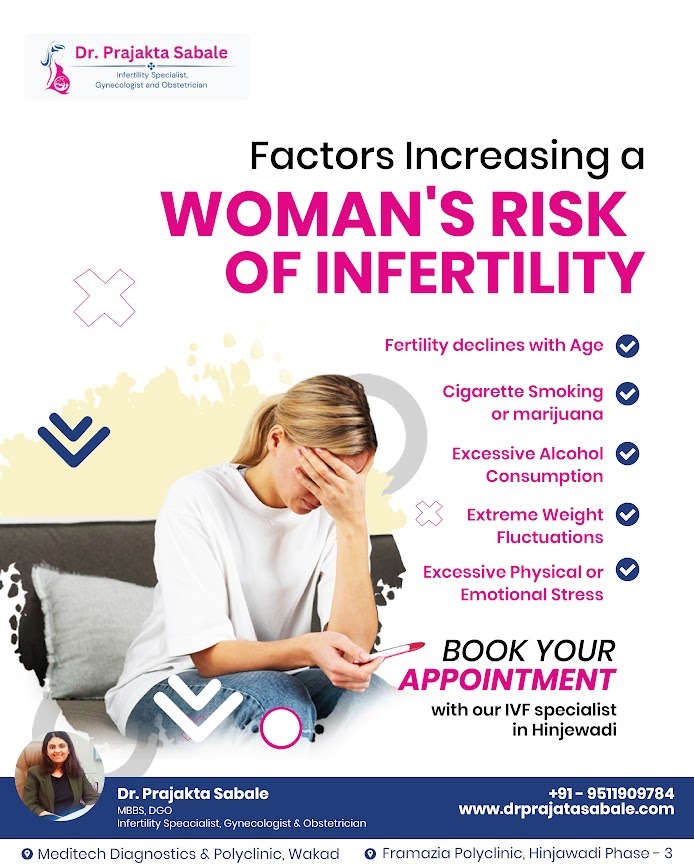Infertility is a growing concern for many women today. With changing lifestyles, increasing stress levels, and various underlying health issues, more and more women are facing challenges in conceiving. Understanding the factors that affect fertility in women is the first step toward taking control of your reproductive health.
If you’re trying to conceive and not getting the desired results, don’t lose hope. Knowing when to seek medical advice can make all the difference. Read on to understand the common causes of female infertility and when it’s time to consult a gynecologist near you.
Common Factors That Can Increase the Risk of Infertility in Women
1. Age
One of the most significant fertility factors is age. A woman’s fertility naturally declines after the age of 30, with a sharper decline after 35. The quality and quantity of eggs decrease, making conception more difficult.
2. Hormonal Imbalances
Conditions like PCOS (Polycystic Ovary Syndrome), thyroid disorders, and prolactin issues can disrupt regular ovulation, making it harder to conceive. Irregular periods or excessive facial hair could be early signs.
3. Lifestyle Habits
Poor nutrition, lack of physical activity, smoking, excessive alcohol consumption, and high levels of stress are all known contributors to infertility. Maintaining a healthy weight and lifestyle can significantly boost fertility.
4. Reproductive System Disorders
Problems like endometriosis, fibroids, or pelvic inflammatory disease (PID) can damage the reproductive organs, block fallopian tubes, or interfere with implantation.
5. Previous Infections or Surgeries
Past surgeries in the pelvic area or untreated STIs (like chlamydia or gonorrhea) can lead to scarring or blockages in the fallopian tubes, impacting fertility.
6. Environmental and Occupational Exposure
Exposure to harmful chemicals, radiation, or excessive heat can affect ovulation and hormone function. Women working in certain industries should be cautious of this risk.
7. Genetic and Autoimmune Conditions
In some cases, genetic abnormalities or autoimmune diseases may affect a woman’s ability to conceive or carry a pregnancy to term.
When Should You Visit a Gynecologist?
It’s recommended to consult a gynecologist or fertility specialist if:
-
You’ve been trying to conceive for more than 12 months (or 6 months if you’re over 35).
-
You have irregular or absent periods.
-
You experience painful periods or pelvic pain.
-
You have a known history of PCOS, endometriosis, or thyroid issues.
-
You’ve had multiple miscarriages or difficulty carrying a pregnancy.
Early diagnosis can help identify the root cause and start the right treatment plan. Don’t wait for things to worsen — your future fertility may depend on timely action.
Expert Care You Can Trust – Dr. Prajakta Sabale
If you’re dealing with infertility or have concerns about your reproductive health, it’s time to speak to a professional. Dr. Prajakta Sabale, a renowned Gynecologist and Fertility Specialist in Hinjewadi, Pune, offers compassionate and advanced fertility care tailored to your individual needs.
With her expertise in diagnosing and treating complex female reproductive issues, she has helped many women achieve successful pregnancies.
📞 Request a Call Back from Dr. Prajakta Sabale IVF Specialist in Hinjewadi
Fill out the form below, and our team will get in touch to schedule your consultation.
👉 Take the first step towards your fertility journey with confidence.
Remember: Infertility is not the end — it’s a sign that your body needs support. Early intervention, the right lifestyle, and expert medical help can lead you to the joy of motherhood. Don’t delay — take charge of your reproductive health today!

